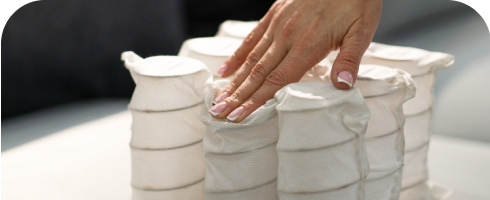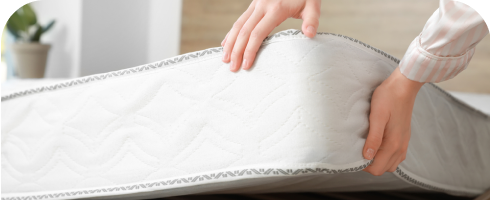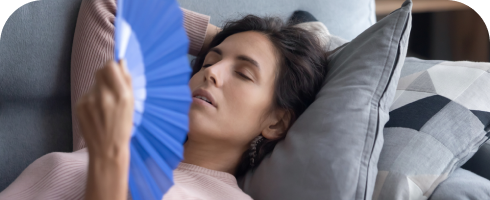How Long Should A Mattress Last?
It’s difficult to overstate the importance of choosing the right mattress based on your personal needs and preferences. You will spend approximately one-third of your time in bed, and a quality mattress can mean the difference between restful slumber and restless tossing and turning. Even the best mattresses will degrade over time, but how long should a mattress last?
This guide will discuss how long mattresses typically last. We’ll help you decide when to replace a mattress, and analyze the typical lifespan of a mattress across various categories.
Trouble sleeping?
Answer these 5 easy questions to discover your perfect mattress

Trouble sleeping?
Answer these 5 easy questions to discover your perfect mattress
What position do you sleep in?

Side

Back

Stomach
How Long Should a Mattress Last?
Most mattresses should last between 7 and 10 years. However, there are many variables that can influence mattress lifespan.
The original build quality of the mattress, the materials used, and even the weight and sleeping styles of the sleepers can all influence a bed’s longevity.
Of course, mattresses don’t have an explicit “expiration date.” It’s up to the individual to decide when it’s time for a new bed. Often, we grow so accustomed to our beds that we don’t notice that there’s a problem.
At the same time, the comfort and support of our mattress is vital to the quality of our sleep. Even though mattresses can be a significant expense, it’s absolutely worthwhile to replace them regularly.
Factors Influencing Mattress Lifespan
While the general guideline is 7 to 10 years, not all mattresses will hold up so well to the tests of time. Several factors contribute to a mattress’s lifespan, including:
Materials: The materials used in a mattress’s construction will have a huge impact on its longevity. Materials like latex and high-density polyfoam can last a long time, while low-density polyfoam can wear out much more quickly.
Original Quality: The quality of your mattress when you originally bought it will have an impact on how long it lasts. A cheap, entry-level mattress will almost certainly wear out quicker than a high-end hybrid mattress. While a higher price tag does not necessarily mean a better product, the general trend is that the more expensive mattresses often have a better quality construction, and tend to last longer.
Mattress Type: Is your mattress an all-foam, hybrid, latex, or innerspring bed? The mattress type can substantially affect its longevity. Latex mattresses tend to last the longest, followed by beds made using high-density memory foams or polyfoams. Lower-density foam beds wear out a bit quicker, as do hybrid models. Traditional innerspring beds generally have the shortest expected lifespan, at approximately five and a half to six and a half years.
Sleep Position & Body Weight: The position you sleep in, as well as your body weight, will affect how quickly your mattress wears out. Heavier sleepers may find that their mattresses begin to sag prematurely, while side-sleepers may find excessive sagging around the hips and shoulders.
Care Routine: Like most things in life, if you take care of your mattress, it will last longer. Proper mattress care includes routine cleaning, utilizing protective covers, and following manufacturer care guidelines. Some mattresses can be flipped or rotated regularly, but be sure to check the manufacturer’s recommendations.
The table below summarizes performance and durability ratings for the most popular mattress types.
| Mattress Type | Innerspring | Foam | Latex | Hybrid |
| Average Lifespan | 5.5 – 6.5 years | 6 – 7 years | 7.5 – 8.5 years | 6.5 – 7.5 years |
| Durability Rating | Poor to fair | Fair to good | Good to very good | Fair to good |
| Resistance to Sagging | Poor to fair | Fair | Good | Fair |
| Resistance to Premature Softening | Good | Poor to fair | Fair to good | Fair to good |
| Resistance to Developing Body Impressions | Good | Poor to fair | Fair to good | Good |
| Overall Longevity Rating | Fair | Good | Very good | Good |
When to Replace a Mattress
Knowing how long a mattress should last is useful, though ultimately, these are just guidelines. Figuring out when it’s time to replace your mattress is a personal decision that involves several factors. Here are some questions to ask yourself:
- Are you sleeping well?
- Do you find that you sleep better at hotels or when visiting family?
- Does your mattress feel saggy or unsupportive?
- Do you wake up with aches and pains?
- Do you or your partner toss and turn through the night trying to get comfortable?
- Do you feel your partner’s movements at night more than you used to?
- Have you noticed an increase in allergies or asthma symptoms?
- Has it been 7+ years since you purchased your bed?
If you can answer “yes” to one or more of these questions, it may be time to replace your mattress.
If you’re still sleeping soundly, and your mattress appears to be performing well, then perhaps you can squeeze a few more years out of it. That being said, we recommend replacing your mattress regularly, as it’s absolutely worth the investment in your health and well-being.
Before you go shopping for a new mattress, it’s worthwhile to check the warranty details for your mattress. If an issue you are having with your mattress is covered under the manufacturer’s warranty, it’s possible that you can get your bed repaired or replaced.
If the mattress is not covered under warranty, it’s time to start shopping for a new bed. Generally speaking, buying a mattress online will be the most economical option, though there are also merits to buying a bed in a mattress store.





















